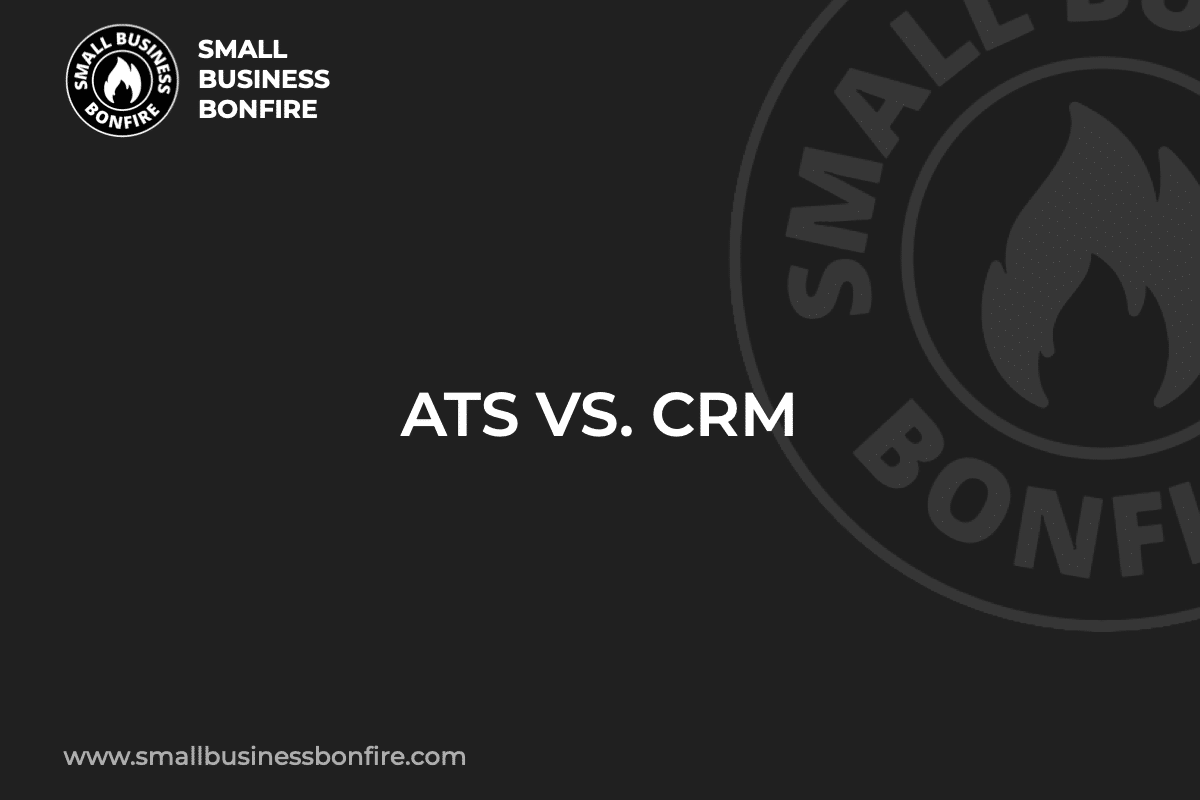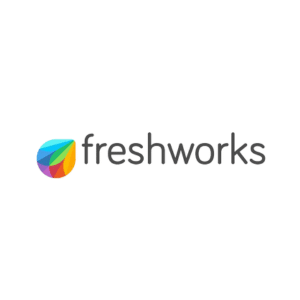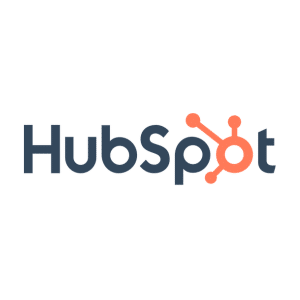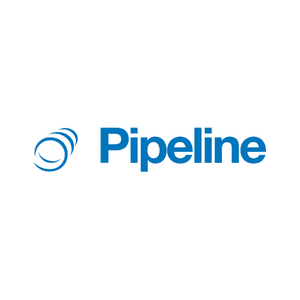Recruiting new hires is crucial for small businesses looking to expand, but it can often be daunting and overwhelming.
Choosing the wrong candidate during the hiring process can be costly for SMBs. However, hiring the right talent is crucial to the success and growth of any small business.
My name is AJ, and I have built, grown, and sold my own business over the last decade.
I began Small Business Bonfire (SBB) to help other entrepreneurs navigate the bumps and hurdles of starting and growing their own businesses.
In this guide, we’ll demystify the differences between Applicant Tracking Systems (ATS) and Customer Relationship Management (CRM) platforms.
Let’s get started!
Key Takeaways
- These systems can help widen the talent pool
- There are many platforms available on the recruitment market
- It is easy for recruiters to schedule and post future job openings
- Both systems can be leveraged to build relationships with active and passive candidates
Related Reading: CRM for Small Businesses
SBB Featured Partners
What Is a CRM (Candidate Relationship Management)?
What is a CRM? CRM stands for candidate relationship management, and it’s a useful tool for businesses to help manage their relationships with potential job candidates.
It’s a way to keep track of all the information you gather about candidates, from their resumes and cover letters to their email correspondence and interview notes.
By using a recruitment CRM system, you can ensure that you have a clear and accurate picture of each candidate’s qualifications and progress in the hiring process.
CRM (Candidate Relationship Management) Software Benefits
One of the major benefits of candidate relationship management systems is that it allows businesses to gain a comprehensive view of their applicants, including the history of their interactions with the company.
This information makes it easier to tailor the hiring process to each candidate’s needs and preferences.
It also helps recruiters build deeper relationships with potential applicants, which can lead to higher-quality hires.
By utilizing a CRM, SMBs can improve recruitment processes and ultimately drive business success.
Key Features of CRM
While at the agency, I used several recruiting CRM software to help me find the perfect candidates.
During that time, I found a few key features that make CRM beneficial for recruitment.
Some of these key features include:
- Candidate nurturing
- Proactive recruitment
- Candidate analytics
- Targeted candidate messaging
Let’s dive deeper into each of these main features!
Candidate Nurturing
Candidate nurturing is a crucial aspect of any successful recruitment strategy!
It refers to building long-term relationships with applicants over time, from passive job seekers to those actively searching for a new opportunity.
This involves creating a personalized experience for each candidate by clearly understanding their interests, skills, and goals.
By doing so, businesses can keep candidates engaged and interested in potential job openings, improving the chances of securing top talent for their organization.
Proactive Recruitment
Proactive recruitment is the process of actively seeking out qualified candidates and engaging with them on a personal level.
This feature gives recruiters a competitive edge in a fast-paced job market by allowing them to efficiently manage large volumes of candidate data and continuously build a robust talent pipeline.
It involves researching potential candidates, reaching out to them about job openings, and building relationships over time.
By utilizing tools like CRMs, SMBs can easily access candidate data from various sources, such as social media profiles or job postings.
With a proactive approach to recruitment, businesses can save time, resources, and money.
Candidate Analytics
Candidate analytics is another great feature of recruitment CRM software that helps SMBs better understand candidates by tracking and analyzing candidate interactions with their brand.
This involves collecting data on candidate profiles, such as age, gender, location, skills, and experience.
With this data, businesses can gain insight into their recruitment strategies and make decisions to help them build stronger relationships with potential hires that will benefit them in the long run.
Targeted Candidate Messaging
Lastly, targeted candidate messaging is a powerful feature offered by recruiting CRM software that allows SMBs to tailor their messages and reach the right candidates at the right time.
This means recruiters can easily segment their candidate pool and send messages to specific groups based on their location, experience, qualifications, job preferences, and other relevant criteria.
For example, they can use candidate analytics to identify areas where they need to improve their processes or target specific candidates with tailored messages that are more likely to engage them.
By sending personalized messages to candidates, recruiters can establish a stronger connection with them and increase the likelihood of them accepting job offers.
With this feature, businesses can create personalized job campaigns that will help them attract top talent more quickly.
How Does a CRM Work?
Recruitment CRM software is designed to build and nurture relationships between recruiters and candidates.
It streamlines the hiring process by making it easier for recruiters to keep track of potential hires, communicate with them, and engage them throughout the recruitment journey.
Furthermore, CRM software provides recruiters with valuable insights into candidate behavior and engagement patterns, enabling them to tailor their hiring approach to better meet the needs of candidates.
By utilizing recruiting CRM software, businesses can improve the hiring process, attract top-notch talent, and establish themselves as leaders in their respective industries.
Does Your Small Business Need a CRM?
Small businesses can benefit greatly from using a CRM solution when it comes to recruitment.
This is because recruitment CRM software allows recruiters to make decisions quickly and accurately, helping them keep up with the fast-paced job market and remain competitive.
Therefore, if you are a small business needing a recruitment solution, investing in a CRM may be your best bet.
CRM Examples
There are multiple recruitment CRM systems that SMBs can use to improve their recruitment process.
Below are two of my favorite CRMs that I used at the agency!
Zoho Recruit
Zoho Recruit is a cloud-based candidate relationship management system that offers several robust features for companies to enhance their recruitment effort.
It allows HR teams to automate job postings across multiple channels, track resume submissions, and schedule interviews with ease.
The software also includes an intuitive dashboard that provides a comprehensive overview of each stage of the hiring process, allowing recruiters to stay organized and on top of their game.
Plus, with its customizable workflows, Zoho Recruit can be tailored to fit the unique needs of any organization.
Do you want to learn more about Zoho? Check out our full Zoho CRM review!
Salesforce CRM
Salesforce CRM is also a popular option for recruitment among SMBs.
With this platform, businesses can monitor all candidate interactions, store their contact information and resumes in one place, and even follow their social media updates.
It also integrates with many other popular software and tools, making it an incredibly versatile option.
Additionally, Salesforce CRM’s powerful analytics provide recruiters with valuable insights into their recruitment efforts, enabling them to make data-driven decisions.
What Is an ATS (Applicant Tracking System)?
An applicant tracking system (ATS for short) is a software application designed to help companies handle their recruitment needs more efficiently.
It automates the recruitment workflow, from posting job openings to screening, interviewing, and hiring candidates.
ATS also enables higher levels of collaboration and communication between hiring teams, allowing them to share candidate information, schedules, and feedback in a centralized hub.
Businesses can streamline their recruitment processes, save time, reduce costs, and improve the candidate experience by using an ATS.
ATS Software Benefits
One of the most significant benefits of using applicant tracking systems is that it helps recruiters save time and effort and enables them to focus on essential tasks such as interviewing, skill assessment, and evaluating a candidate’s suitability.
The system automates most recruitment tasks, such as tracking resumes, identifying top candidates, scheduling interviews, and follow-ups, allowing the hiring manager to speed up the entire hiring process.
Additionally, an ATS can help ensure that you comply with hiring regulations and track candidates fairly and consistently.
These benefits increase efficiency and lead to better candidate experiences, which is essential in today’s competitive job market.
Key Features of ATS
While using different ATS at the agency, I discovered some main features that made the hiring process a breeze!
These features include:
- Candidate sourcing
- Managing interviews
- Candidate relationship management
- Reporting and analytics
Let’s take a closer look at each!
Candidate Sourcing
One of the key features of an ATS is its ability to assist with candidate sourcing.
This means the system can help you identify potential candidates from various sources, such as job boards, social media platforms, and your database of past applicants.
These sourcing capabilities not only reduce the amount of time and resources needed to find candidates, but they also increase the diversity of your applicant pool.
By utilizing these features, you can ensure that you’re attracting the most qualified candidates for your open positions.
Managing Interviews
Another useful feature of an applicant tracking system is its ability to help you manage interviews.
This includes scheduling interviews, sending automated email invitations, and collecting interview feedback from your team in real time.
It makes the interview process much more manageable and efficient, allowing you to focus your time and energy on finding the best talent for the job.
In addition, ATS can even automate the follow-up process with candidates, sending them personalized messages and reminders so a hiring manager doesn’t have to.
Candidate Relationship Management
Additionally, ATS helps businesses manage the relationships between recruiters and candidates.
It enables hiring managers to maintain a positive relationship with their candidates and ensure that they are kept informed about the status of their applications throughout the recruiting pipeline.
With this feature, businesses can automatically send reminders and updates to candidates regarding interview times, follow-up steps, and other important recruitment milestones.
This helps to build trust and enhance the candidate experience, which is crucial for SMBs that want to attract top talent and retain their employees.
Reporting and Analytics
Finally, ATS also offers powerful reporting and analytics capabilities.
This enables businesses to track their recruitment efforts and measure the success of their hiring processes.
It also allows recruiting teams to identify potential areas for improvement and make data-driven decisions about how to optimize their process.
The insights gained from these reports can help SMBs find the best candidates for each role and make the most of their resources.
How Does an ATS Work?
An ATS works by automating various recruitment activities and tasks. When candidates apply for jobs, the system collects and stores their information in its database.
This data is then used to help hiring managers identify the best-qualified candidates for each job opening.
Once a decision is made, the system can also efficiently onboard new hires.
With an ATS, businesses can easily manage large volumes of resumes and job applications.
This system guarantees a streamlined hiring process, giving business owners and hiring managers more time to focus on other important tasks.
Does Your Small Business Need an ATS?
If your small business receives many job applications or you’re struggling to organize your hiring process, then an ATS may be worth considering.
It can save you valuable time and also reduce the risk of human error in the hiring process.
Moreover, an ATS can assist in tracking hiring metrics such as time-to-hire and cost-per-hire.
So, if you’re tired of manually sifting through applications and struggling to keep track of the hiring process, consider investing in an ATS to help you out!
ATS Examples
Like CRMs, many different ATS systems are available on the market.
Below are some of my top ATS options!
Greenhouse
Greenhouse is a cloud-based ATS software that helps streamline the hiring process by organizing resumes and applications, automating tasks such as interview scheduling and sending out offer letters, and providing analytics on recruitment metrics.
It also integrates with other HR tools, such as job boards and background check providers, to create a seamless experience.
SMBs can customize Greenhouse to fit their unique hiring needs, and the platform also offers a personalized onboarding portal for new hires.
Workable
Workable is another cloud-based platform that offers features like job posting management, resume screening, interview scheduling, and custom hiring pipelines.
It allows you to post job openings to multiple job boards with just one click and lets applicants apply with their LinkedIn or Google profile, saving them time and making it more likely they’ll complete the application process.
With it, you can track applicant progress at every stage, automate tasks, and collect valuable data to optimize your hiring strategy.
Plus, its intuitive interface and mobile app make it easy to use on the go.
Do You Need Both CRM and ATS?
If you’re running a small or medium-sized business, you may be wondering if you need both a CRM and ATS.
The short answer is that it depends on your business needs and goals.
While there may be some overlap in functionality, each software serves a distinct purpose.
However, having both a CRM and an ATS can help you establish a seamless workflow for your hiring processes.
CRM vs. ATS: What's the Difference?
CRM and ATS are powerful tools that can significantly impact the productivity and organizational structure of SMBs. However, these two systems have different functions and goals.
How is an ATS and CRM Different?
An ATS is a recruitment software that automates applicant tracking, resume screening, and interview scheduling tasks.
This system helps recruiters identify the best candidates and onboard new hires quickly.
On the other hand, a CRM is a tool designed to help you manage your relationships with candidates.
Its primary focus is nurturing relationships with your candidates, keeping them engaged, and building a valuable connection with them.
Just as there are distinct variations between ATS and CRM, there are also numerous types of software that differ from CRM.
How is an ATS and CRM Similar?
When it comes to managing the talent acquisition process, CRM and ATS share a lot of similarities.
Both tools are crucial in managing and maintaining relationships with job candidates, providing a central platform for managing resumes and tracking all interactions with potential hires.
Ultimately, these tools can help SMBs improve their entire recruitment process and attract a more qualified, diverse talent pool.
Similar Articles You Might Be Interested In
Now You Decide
Understanding the difference between ATS vs. CRM is crucial for SMBs looking to streamline their recruitment process.
Depending on your business needs and goals, you may require one or both systems to manage and grow your business effectively.
By taking the time to carefully evaluate your options, you can choose the right system to suit your unique needs and ensure that your business is operating at maximum productivity and efficiency.
Are you a small business owner in the middle of the hiring process? Do you have any questions about ATS vs. CRM? Let us know in the comments below!
FAQs ATS vs. CRM
ATS can benefit small businesses by eliminating manual processes and reducing the time and costs associated with recruitment. With the right ATS software, businesses can source and track candidates more efficiently, improve candidate experience, and make more informed hiring decisions.
Candidate Relationship Management (CRM) is a tool used by businesses to manage their interactions with potential job candidates. It is a system that supports the hiring process by helping companies build and manage relationships with potential talent.
Yes, many businesses use both ATS and CRM software together to manage their recruitment relationships. By integrating the two systems, businesses can improve data sharing and communication across departments, as well as gain a more comprehensive view of their interactions with candidates. This integration can lead to greater efficiency, improved hiring experiences, and better business outcomes.
ATS makes the hiring process easier for SMBs by streamlining the recruitment process. It helps to post job listings, screen resumes, schedule interviews, and send automatic email responses.
Newsletter Signup
Join The Leads Field Guide Newsletter for tips, strategies and (free) resources for growing your leads, and closing more deals.




